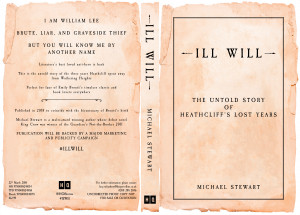Celebrating the Brontӫs
In Victorian Britain the writing of the Brontӫs was considered by some to be scandalous, uncouth and coarse. Over the years their writing has become sanitised and Dr Michael Stewart is re-engaging with their legacy in order to shed new light on their life and work. He is focussing on what is wild and savage about their writing and exploring the world outside of Wuthering Heights.

Dr Michael Stewart’s creative writing has received many awards and accolades and his latest work is inspired by the Brontӫs. Wuthering Heights was originally published in 1848 and Dr Stewart’s latest novel Ill Will considers what happens when Heathcliff runs off in the storm. It explains the missing years and how he turned from an uncouth stable boy to a gentleman psychopath.
Dr Stewart’s research for Ill Will included consulting various archives, such as The Liverpool Maritime Museum and the slavery archives at Liverpool City Library, as well as speaking with historians from the Liverpool Record Office, the Peel Group and Chetham’s Library in Manchester.
During the writing of the book, Dr Stewart walked hundreds of miles across the Yorkshire Moors and from Top Withens, the inspiration for the location of Wuthering Heights, to Liverpool docks. He re-enacted the walk that Mr Earnshaw took in 1771, which resulted in him returning with Heathcliff.
As part of the book launch Dr Stewart shared proof copies at the Bradford Literature Festival on 8 July 2017. HarperCollins is publishing the hardback in early 2018 and the paperback later in the year and Dr Stewart is currently negotiating film and television rights.
The Brontӫ Stones
Funding has been secured from the Arts Council and Bradford Council for a trail of engraved stones commemorating the bicentenaries of the birth of the Brontӫs. Dr Stewart is leading on this project called the ‘Brontӫ Stones’, which will see a stone each for Charlotte, Emily, Anne and Branwell Brontӫ. The Charlotte Stone will be placed in the wall of the birthplace in Thornton; the Emily Stone will be placed in the middle of Thornton Moor overlooking Oxenhope; the Anne Stone will be placed in the meadow at the back of the Parsonage in Haworth and the fourth stone will be a hidden stone.
The stones will be carved with specially commissioned writing from some of the most prestigious writers in the country, including Carol Ann Duffy, Jackie Kay and Jeanette Winterson. The stones will be in place in 2018 and there will be a series of walks, events, and talks organised around the stones. These events will be aimed at readers, writers and walkers and there will be school and college projects to engage with young people.
The Brontӫ Stones and the book Ill Will, will both be part of a focussed marketing strategy by HarperCollins to coincide with the bicentenary of the birth of Emily Bronte in 2018.

Spotlight
Dr Michael Stewart
Dr Michael Stewart has had a busy year chairing four events at the Bradford Literature Festival: Gothic Yorkshire, Andrea Dunbar the Writer, Northern Noir: Bradford in Crime Fiction and Inspired by the Brontӫs. He has won several awards for his innovative writing, including the BBC Alfred Bradley Bursary Award (2003), the King’s Cross Award for New Writing (2004) and The Guardian’s Not the Booker Prize (2011) for his debut novel, King Crow. His novel, Café Assassin, was published by local independent publisher Bluemoose Books in 2015. His book Mr Jolly is a collection of short stories. His new novel, Ill Will, will be published by HarperCollins in March 2018. Michael’s creative approach to writing and narrative study informs his teaching and is the basis for Grist, an anthology of new writing publications each year which gives a platform to some of the best emerging poets and short fiction writers. To find out more about his research, please contact Dr Michael Stewart, email: m.stewart@hud.ac.uk
Summer 2017 Issue
Return to the home page for the Summer 2017 Issue of Discover.
Next article
MIAMI-2 has established the University of Huddersfield as one of Europe’s leading centres for the use of ion beams as a tool for the.....